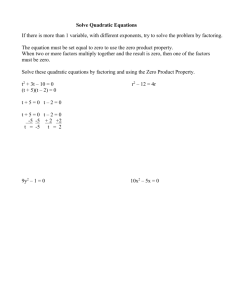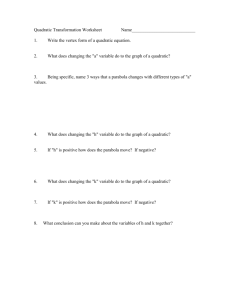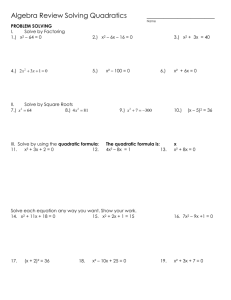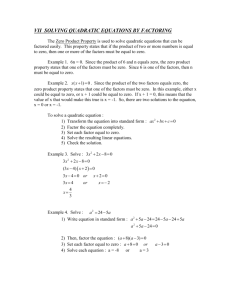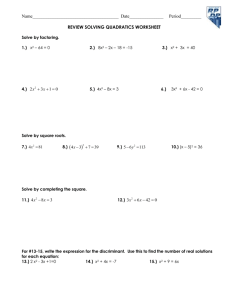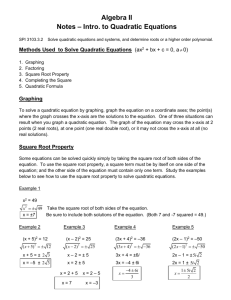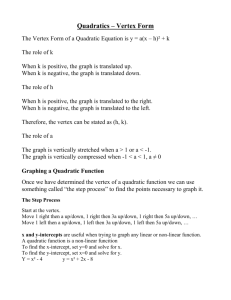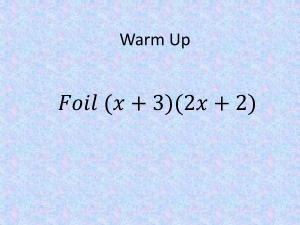woodland hills secondary lesson plans
advertisement
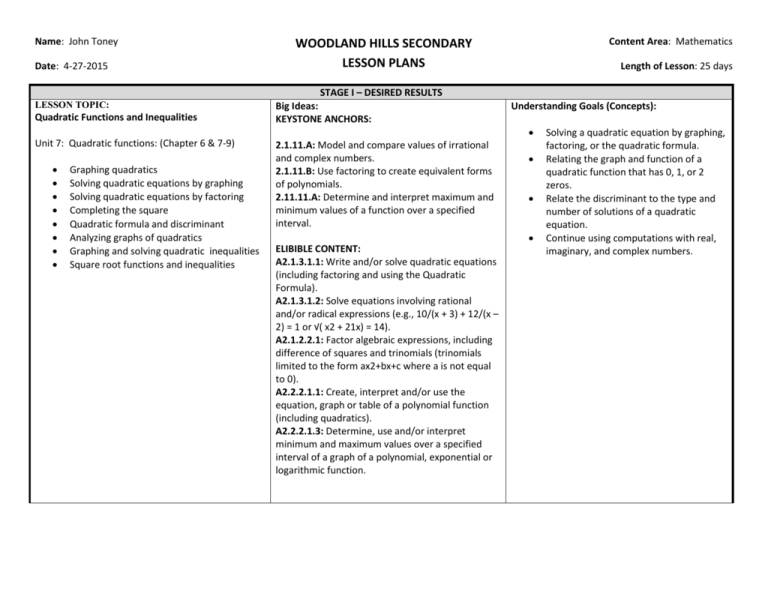
Name: John Toney Date: 4-27-2015 Content Area: Mathematics WOODLAND HILLS SECONDARY LESSON PLANS Length of Lesson: 25 days STAGE I – DESIRED RESULTS LESSON TOPIC: Quadratic Functions and Inequalities Big Ideas: KEYSTONE ANCHORS: Understanding Goals (Concepts): Unit 7: Quadratic functions: (Chapter 6 & 7-9) Graphing quadratics Solving quadratic equations by graphing Solving quadratic equations by factoring Completing the square Quadratic formula and discriminant Analyzing graphs of quadratics Graphing and solving quadratic inequalities Square root functions and inequalities 2.1.11.A: Model and compare values of irrational and complex numbers. 2.1.11.B: Use factoring to create equivalent forms of polynomials. 2.11.11.A: Determine and interpret maximum and minimum values of a function over a specified interval. ELIBIBLE CONTENT: A2.1.3.1.1: Write and/or solve quadratic equations (including factoring and using the Quadratic Formula). A2.1.3.1.2: Solve equations involving rational and/or radical expressions (e.g., 10/(x + 3) + 12/(x – 2) = 1 or √( x2 + 21x) = 14). A2.1.2.2.1: Factor algebraic expressions, including difference of squares and trinomials (trinomials limited to the form ax2+bx+c where a is not equal to 0). A2.2.2.1.1: Create, interpret and/or use the equation, graph or table of a polynomial function (including quadratics). A2.2.2.1.3: Determine, use and/or interpret minimum and maximum values over a specified interval of a graph of a polynomial, exponential or logarithmic function. Solving a quadratic equation by graphing, factoring, or the quadratic formula. Relating the graph and function of a quadratic function that has 0, 1, or 2 zeros. Relate the discriminant to the type and number of solutions of a quadratic equation. Continue using computations with real, imaginary, and complex numbers. Student Objectives (Competencies/Outcomes): Students will be able to: Graph quadratic functions in standard form and find the max and min points.( 2 days) Identify the domain and range of quadratic functions. ( contained in #1) Solve quadratic equations by: factoring, ( 2 days) taking the square root, ( 1 day) completing the square ( 2 days) quadratic formula. ( 2 days) Use the discriminant to determine the number and type of roots for a quadratic equation. ( 2 days) Solve real-world problems, which are modeled by quadratic functions. (2 days) Graph and analyze (state domain and range) square root functions. ( 2 days) Essential Questions: How can you extend algebraic properties and processes to quadratic, exponential and polynomial expressions and equations and then apply them to solve real world problems? What are the advantages/disadvantages of the various methods to represent exponential functions (table, graph, equation) and how do we choose the most appropriate representation? Vocabulary: Axis of symmetry (2) Parabola (2) Quadratic function (2) Completing the square (3) Discriminant (3) Quadratic formula (2) Roots (1) Vertex (1) Zeros (2) Vertex (1) vertex form (3) STAGE II – ASSESSMENT EVIDENCE Performance Task: Students will demonstrate adequate understanding via a chapter test. Materials and Resources: Textbook, notes Formative Assessments: Pre-assessments, open-ended questions, Think-Pair-Share STAGE III – LEARNING PLAN Interventions: Flexible grouping, students will be encouraged to attend math lab Instructional Procedures: Monday Date: 4/27 Day : A “Do Now” –Graph quadratic equation. Wednesday Date: 4/29 Day: A “Do Now” – Determine if a given quadratic equation opens up or down and has a max or min. Find the y-int, vertex, and axis of symmetry. Build a table a values and then graph it. “Mini Lesson” – Show answers to homework problems and explain any that were missed. Monitor students working worksheet pg 316 giving help as needed. “Mini Lesson” – Show answers to homework problems and explain any that were missed. Discuss and give guided notes on section 6-2, how to solve a quadratic equation by graphing. Show class that solving means to find where it crosses the x-axis. Work on guided practice problems for class to practice on. 6-2 NB HW Finish 6-1 NB HW part 2 Finish worksheet pg. 316 From section 6-1 Thursday Date: 4/30 Day: B “Do Now” –Solve a quadratic equation by graphing. Friday Date: 5/1 Day:A “Do Now” –Solve a quadratic equation by graphing. “Mini Lesson” – Show answers to homework problems and explain any that were missed. Work on a few problems as guided practice with class from worksheet page 321. Monitor students finishing worksheet pg 321 giving help as needed. “Mini Lesson” – Show answers to homework problems and explain any that were missed. Discuss and give guided notes on section 6-3, how to solve a quadratic equation by factoring. Show class that solving means to find where it crosses the x-axis. Work on guided practice problems for class to practice on. Finish worksheet pg. 321 From section 6-2 6-3 NB HW Assignments Procedures “Mini Lesson” Finish example 4 from 6-2 part 2 in notebooks. Monitor students working on guided practice problems in notebooks, section 6-2 part 2 NB HW. Tuesday Date: 4/28 Day: B “Do Now” – Determine if a given quadratic equation opens up or down and has a max or min. Find the y-int, vertex, and axis of symmetry. Build a table a values and then graph it. *Include Do Now, Mini Lesson, Guided Practice, Independent Practice, Summations/Formative Assessments, Reflections

